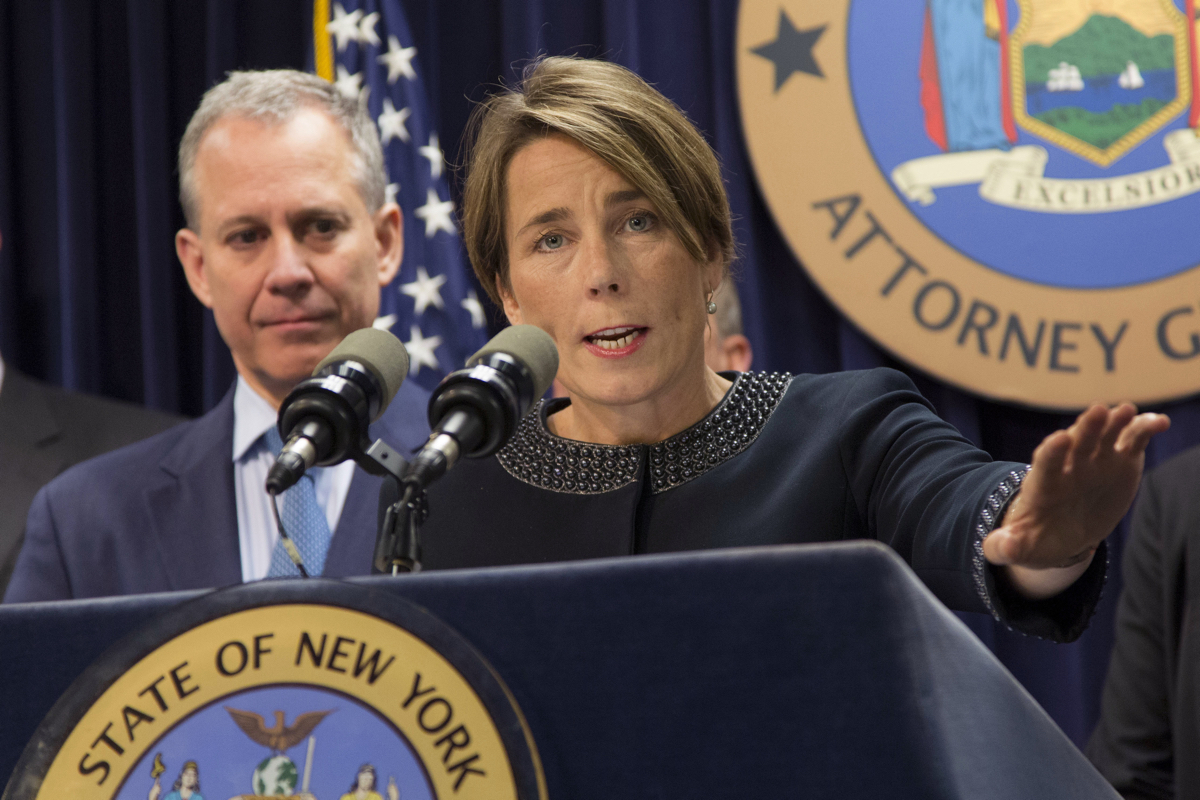Massachusetts Doesn’t Like Travel Ban 2.0 Either

Photo via AP
So President Trump unveiled his administration’s highly anticipated second try at a travel ban yesterday, and this one isn’t going over well either.
Not surprisingly, Massachusetts’ political voices quickly pounced on the updated version of the ban, which came after courts challenged the prior one that suspended the U.S. refugee program and blocked travel from seven Muslim-majority countries.
The new executive order removes Iraq from its list of countries targeted by the ban, it includes exemptions from the ban for people with permanent resident status or who have already been issued visas or been permitted to enter as refugees, and it no longer includes a rule that would have permitted non-Muslims living in those countries to bypass the ban.
The executive orders, the Trump administration says, are intended to keep Americans safe from terrorism. But just like the first time around, Massachusetts isn’t buying it. In no uncertain terms, they are making clear they don’t like Travel Ban 2.0, either.
“While this administration is packaging this as a new and improved executive order, it is the same ban that discriminates against the same people,” Boston Mayor Marty Walsh said in a statement. “It was wrong the first time and it’s wrong the second. In Boston, we will always stand by our immigrant community.”
Trump as a candidate repeatedly promised his supporters he would deliver a temporary ban on all Muslims entering the country, but later diluted that message, saying he would seek to exclude travel from countries he believes pose a terrorist threat: Now, that means Syria, Iran, Sudan, Libya, Somalia, and Yemen.
Attorney General Maura Healey, who announced in January that her office would join in a legal effort to quash the first executive order, also criticized this one.
“The President’s travel ban was already rejected by the courts and abandoned in defeat by his attorneys. This watered-down redraft is a clear attempt to resurrect a discredited order and fulfill a discriminatory and unconstitutional campaign promise,” Attorney General Maura Healey said in a statement. “My office remains opposed to this misguided policy and will consider all legal options to protect our residents, our institutions, and our businesses in Massachusetts.”
Earlier this year, a Boston judge ruled in favor of the White House on the validity of the order. A federal court in Seattle blocked it. It’s not yet clear whether the revised order will clear courts, but it does resolve many of the issues opponents had pointed to in arguing it was illegal.
Gov. Charlie Baker, who has spoken out about the threats posed to the economy by hasty and overly broad immigration decisions (he wrote a letter to Homeland Security Secretary John Kelly about it in February), told the State House News Service last night he hadn’t seen the new order, but said he would “take a good look at” it.
“Massachusetts is a global community and a welcoming state and a huge part of our success as a commonwealth – culturally, economically and just generally – is based on the fact that we have a lot of people in this country who bring points of view and perspectives from around the world to their work and to their communities,” Baker said. “That is a big part of who we are and what we’re about and we’ll obviously take a good look at this when we see it.”
Gus Bickford, chair of the state’s Democratic party, fiercely criticized the new order, calling it a “Muslim ban”—a designation the White House now rejects.
“This is not about national security, it’s about playing politics and ratcheting up fear and discrimination,” Bickford said in a statement. “While others may be afraid to call this what it is, we are not. This is a Muslim ban that, many national security experts agree, will make us less safe. Unfortunately, President Trump is continuing to prove that a leopard can’t change its spots.”
When the first ban was announced suddenly in January, it brought confusion to airports for travelers who found themselves blocked from entering the country, and spurred protests at Logan, in Copley Square, and elsewhere. Opposition to the ban was overwhelming. Boston’s colleges spoke out, as did the state’s top hospitals. Boston chefs hosted fundraisers. Immigrants here participated in a general strike called “A Day Without Immigrants.”
The response here was less pitched this time, likely because the ban doesn’t keep workers and family members stranded overseas. But expect challenges to come soon. The ACLU of Massachusetts said it would “closely monitor this new Executive Order and assess its validity,” according to legal director Matthew Segal.


